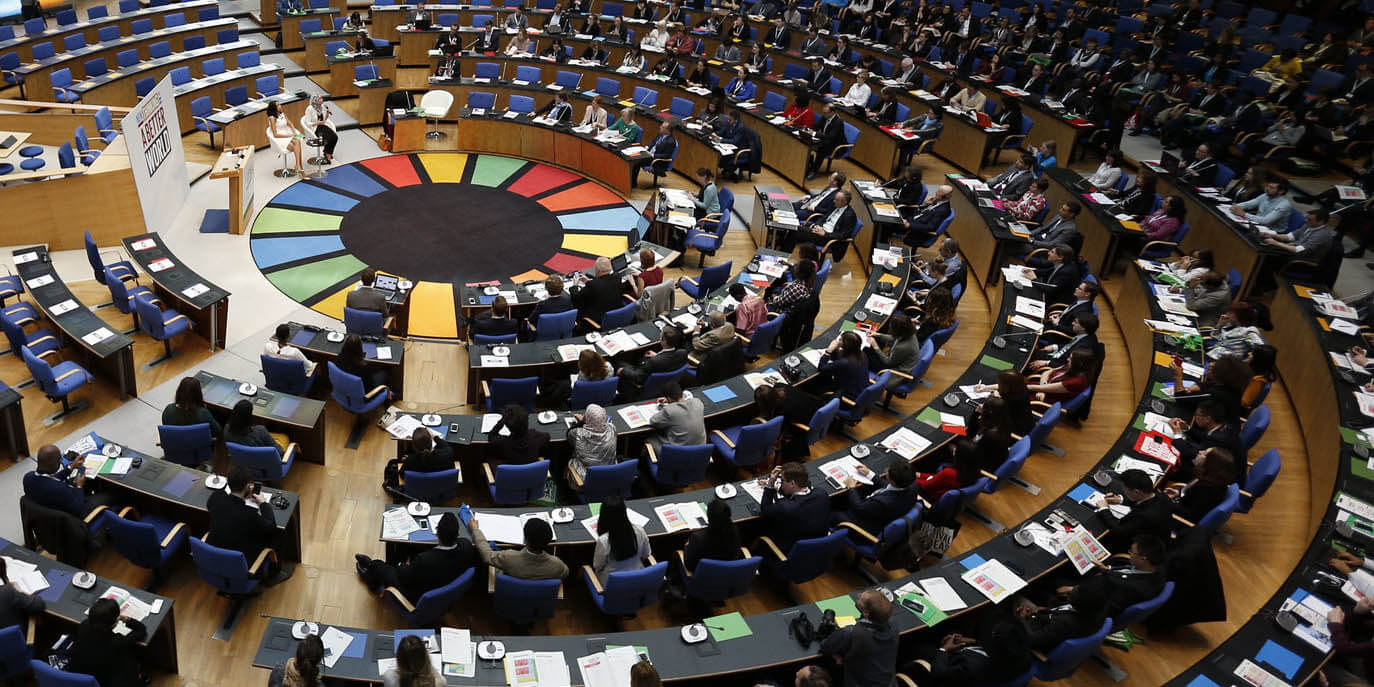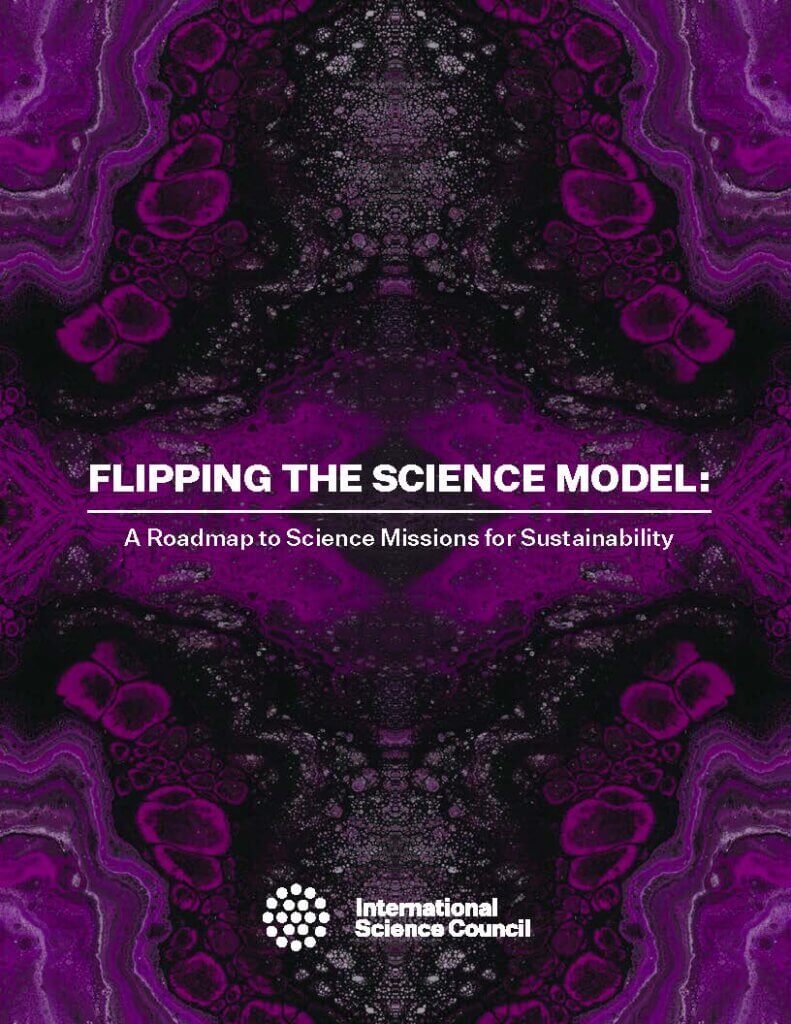
To maximize the SDG Summit’s impact, the Secretary General convened the SDG Action Weekend to explore new opportunities and partnerships to drive SDG transformation between now and 2030. On 16 September, UN DESA, in collaboration with the Sustainable Development Solutions Network (SDSN), the World Meteorological Organization (WMO), United Nations Development Programme (UNDP), and the International Science Council (ISC) held an official session, “Catalyzing Transformative Change: Science, Academia, and the Journey to 2030“, at the SDG Action Weekend.
Under the moderation of Nikhil Seth, Executive Director of the United Nations Institute for Training and Research, Melody Brown Burkins, Director of the Institute of Arctic Studies at Dartmouth College and Member of the ISC Governing Board and ISC Fellow, delivered the following statement:
Nikhil Seth: What is topmost in your mind for a stronger science-policy interface. How can we bring science and the scientific method to intelligent national and global policy, what can we do to make the voice of science matter?
Melody Brown Burkins: Thank you so much for having me here. Yes, I’m here as part of Dartmouth College and I am also with the International Science Council, a co-convener of this session.
As I think about strengthening the science-policy interface, one of the things I want to talk about for the future – to make that interface even better, to ensure a more sustainable planet – is that we make a real investment in ethical and equitable knowledge co-production.
I’ll go into this a bit further in my later comments, but knowledge co-production includes scientists really listening to and working with policy makers to define our missions to sustainability. It means investing in platforms such as those in which the ISC works with the United Nations, where science policy conversations and partnerships can happen.
We heard about the importance of this in the keynote about missions and moonshots (by Professor Mariana Mazzucato): we need platforms where trusted, meaningful relationships are created and where knowledge sharing – knowledge coproduction – can thrive so that everyone is on the same page.
I’m going to add that, if we want more ethical and equitable knowledge co-production, it is up to both scientists and policymakers to also widen those platforms. We need to make sure that we bring in the interests of communities, the voices of indigenous peoples around the world, of youth, of businesses, of all of the diverse knowledge systems that we have on this planet, to the table.
This connection of diverse knowledge is needed for a more sustainable, inclusive, equitable future. It is also critical for the amplification of science policy. It needs us to ask: how do we make sure that our science policy systems are ethical, equitable, engaged, inclusive, and bring diverse knowledge systems together? We need to work on this, because it is how we will create pathways to a more sustainable planet.
NS: You have been an inspiring advocate for the voice of science for societal engagement. How can we make the voice louder and clearer, more multidisciplinary, more inclusively produced, relevant to society and more widely available?
MBB: There are two ways in which the science community can ensure this.
First, it is about the science policy process – how we do it. Second, we need to focus on the funding of that pathway.
To ensure our voices are stronger – to have the science and society, and science in policy, voices stronger, more inclusive, more interdisciplinary, more impactful, more meaningful – I go to a basic equation: if we want solutions that are inclusive, equitable, and ethical, then all of the knowledge systems that we use to find those solutions must be inclusive, ethical, and equitable.
We cannot expect inclusive, equitable, and ethical solutions to come from competitive, exclusive, individualized knowledge systems.
This means our science policy systems – our knowledge systems themselves – also have to rethink themselves and learn how to be more inclusive. If we want to amplify scientific voices, we have to rethink how we’re actually engaging. Are we engaging in an ethical and equitable way? Are we co-designing and co-producing knowledge on the ground, with communities, in a way that people want to work with scientists and advance work at the science policy interface?
So, the process – how we do our science – is key.
And the funding is also critical. Funding for science, and for science policy, needs to define that – when we have the funding we need for our ambitions (and I do hope we will have funding billions of dollars for moonshots to achieve the SDGS!) – that funding has to come with requirements and guardrails that ensure more ethical, equitable, and inclusive processes.
Funding agencies need to understand they define the process. They help define the incentives. They help define the boundaries that the scientists will ultimately have. If funders say that you need to be more inclusive and ethical and equitable, that you need diverse knowledge systems, that your final results need to be translated into multiple languages so everyone who was part of the process could actually read the results, that will happen. Scientists will do this if the funders support this type of inclusion and ethical, equitable engagement.
Both the process and the funding are critical, and I’ll give two examples we already have to guide us. These are in addition to the GSDR (Global Sustainable Development Report) that was just mentioned by my colleague here on the panel. I strongly encourage you read it.
My first example: the International Science Council – just in July of this year – put out of a report called “Flipping the Science Model: A Roadmap to Science Missions for Sustainability.” It calls for these co-designed, co-developed engagements by the science community with policy makers, with governments, with communities, and with Indigenous Peoples around the world to make our missions to sustainability truly successful.

Another example comes from the fact that that I also direct the Institute of Arctic Studies at Dartmouth. I want to tell you how much I’ve learned from the Arctic Indigenous Peoples who have for years been asking for science to change and work with them to achieve a more sustainable future, a more resilient future in the Arctic, that they would like to see and that they deserve.
The “2022 Circumpolar Inuit Protocols for Equitable and Ethical Engagement” – a report written by the Inuit Circumpolar Council (ICC) – is another report that I’ve learned so much from. It tells us we must understand that we cannot do science without practicing ethical and equitable engagement with Arctic Indigenous Peoples. They are clear: “Not about us, without us.” The 2022 ICC report lists all of the principles that you would need as a scientist or a policy maker to work in the Arctic more ethically and equitably.
Of course, this report is not just for science and policy engagement in the Arctic – they are principles that can, and should, be practiced around the world.
These two reports talk about new ways we must work together – and are much more thoughtful of how we engage – for the future of our entire planet. These are the ways science can have a larger voice, a better voice, a more impactful voice in society.
NS: Listening to all of you, the question is more than interface between the voice of science and policy makers. It is more about science and society. A sure way of getting politicians to listen. How can we amplify this voice and interface?
MBB: I will be quick; I will say I do believe we continue to need curiosity-driven science. We also need more mission-driven science.
So how do we get there? How do we amplify the science policy voice and interface for mission-driven science? I think we need to continue to invest in what many call “boundary spanners.” These are the folks who may be trained as scientists but want to work in international relations or in policy. They are science policy and science diplomacy professionals.
We need these boundary spanners, these translators of science, technology, and innovation into policy. We need people who can work in, and across, different communities and ideas, connecting them and advancing innovative ideas.
We will always still need scientific folks at the scientific bench doing what they do so well. But if we don’t also incentivize boundary spanning in higher education and train science policy and science diplomacy professionals to help connect and advance ideas, then we won’t have the boundary spanners we so desperately need for a more sustainable future.
📺 Watch Melody’s statement on the UN Web TV:
Harnessing science to accelerate progress on the Sustainable Development Goals
This statement summarizes insights from the first-ever Science Day, which brought together scientists to help accelerate progress on the Sustainable Development Goals. It calls for strengthening the science-policy interface and creating a “global transformation road map” to address interwoven crises.
Disclaimer
The information, opinions and recommendations presented in our guest blogs are those of the individual contributors, and do not necessarily reflect the values and beliefs of the International Science Council